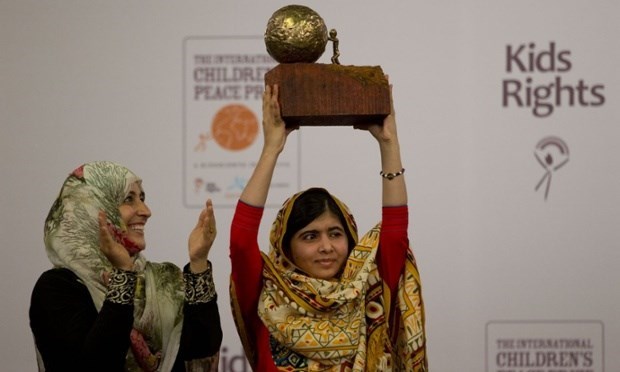 |
| Tawakkol Karman and Malala after prize awarded (AP (Peter Dejong)) |
The 2013 International Children's Peace Prize was recently awarded to 16 year old Malala Yousafzai, the Pakistani girl who stood up to the Taliban in her country over the rights of girls to an education. It almost cost her life, but one year after being targeted and shot by Taliban gunmen on her way home from school, Malala stands as a beacon of light and hope for children everywhere who just want to go to school. On this historic night, Malala dedicated her award: "on behalf of all of the children in the world who are trying to go to school, and all of those parents who are overcoming fear and intimidation - or cultural opposition - to give their sons and daughters the chance of an education." Her speech sometimes became very emotional especially when she touched on the attack and she went on to say: "In my home country of Pakistan, the Taliban uses terror to try and stop girls going to school. I was just one target for their violence. There are many others whose names are not known. It is for them that we must continue our campaign to ensure that all children in the world have the chance to go to school." (Please see her full speech at the end of this story)
Each year the International Children's Peace Prize is given by an adult Nobel Laureate and in Malala's case she received her prize from Yemeni Nobel Peace Prize Laureate Tawakkol Karman who called Malala "my hero" saying "you have become an inexhaustible source of inspiration to millions of girls."
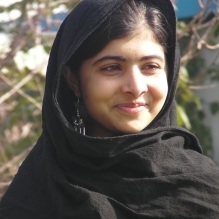 |
| KidsRights |
So how did this inspiring prize launched in 2005 come into being? MY HERO recently interviewed the founder of the International Children's Peace Prize, Marc Dullaert in the Netherlands.
What motivated you to start KidsRights and then the International Children's Peace Prize?
"During my travels for my job as TV-producer, I ended up visiting a refugee camp in Sierra Leone in the beginning of 2003. Although I already had seen children in situations of extreme poverty, neglect and little hope before, here, in this camp, my heart broke: I saw the corpses of children being thrown on a truck for burial outside of the camp. I immediately called my wife and said: enough is enough. We have to do something. As such, I launched KidsRights in the summer of 2003. In 2004, I saw on TV howï Ms.Wangari Maathai received the Nobel Peace Prize. I thought to myself, there should be a junior Nobel Peace Prize, because in my travels I had seen many courageous children helping others, claiming their rights and claiming a world of peace and justice. And so my journey began: the International Children's Peace Prize was launched by KidsRights during the 2005 World Summit of Nobel Peace Laureates chaired by Mikhail Gorbachev. Since then, the prize has been presented every year by a Nobel Peace Prize Laureate."
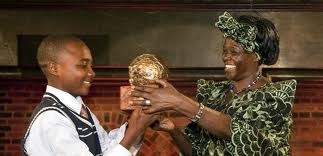 |
| 2009 winner Baruani Ndume with Wangari Maathai (KidsRights ) |
How has winning the prize changed the lives of those who have won to date?
"I guess it is best to ask the winners themselves. Yet, Chaeli Mycroft, the winner of 2011, said during the award ceremony of September 6th: "Winning the prize has given me a platform to do my activism in a way that is going to reach a lot more people. It gives me a global platform which is very cool". This is the aim of the prize: to give these children a world-wide platform to speak up and draw the attention to the children's rights the winners strive to achieve. The project fund of 100,000 that is invested by KidsRights in projects that are closely connected to the winners' area of work concretely contributes to the wellbeing of vulnerable children."
Can anyone nominate a child for this award?
"Absolutely."
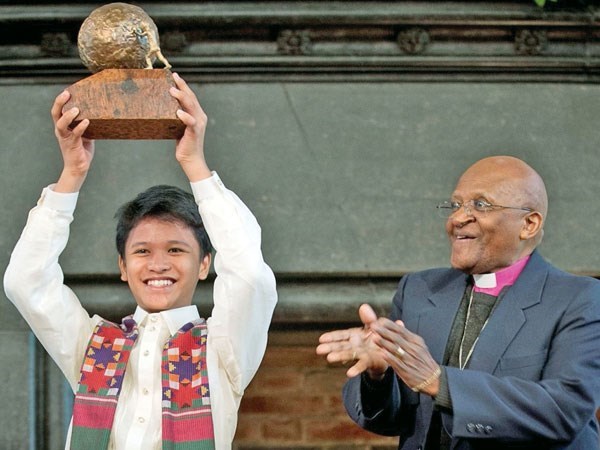 |
| Desmond Tutu with 2012 winner Kesz (KidsRights ) |
You have met some amazing human beings I am sure... who is your hero and why?
"Desmond Tutu is my hero, because during the Apartheid regime he had the courage to stand up for the oppressed. Still today he is the moral leader who dares to confront people and make an appeal on their humanity and compassion. At the same time he forgives and asks for reconciliation. I asked Archbishop Tutu personally to become a patron of KidsRights and the International Children's Peace Prize. I am grateful that he said yes. At our introduction, he captured the essence of our work and the Children's Peace Prize as follows: "So...KidsRights is giving a voice to the voiceless."
What do you have to say to kids around the world who are in intolerable situations?
"Try to unite with other children who are suffering and try to raise your voice together, so that you will be heard. Someone, somehow will listen to you, never give up hope! If the people lead, if the children lead and raise their voice, eventually the leaders will follow."
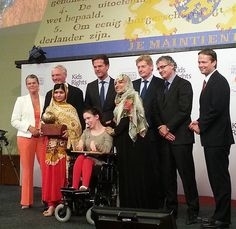 |
| Malala, Marc and 2011 winner Chaeli Mycroft (KidsRights ) |
How is your work going as Children's Ombudsman?
"As the first Children's Ombudsman in The Netherlands, appointed by the parliament, I experienced the past years as a pioneering period. We managed to set a number of important children's rights issues high on the agenda, such as child abuse, poverty and the right to be heard in court. As a result a national taskforce against child abuse and an anti-poverty program for cities has been established. Also, support by the judiciary for a dedicated advocate of children in court has been attained."
If you had the attention of the world for 5 minutes what would you do or say?
"I would give the floor to our Children's Peace Prize winners, to tell their stories and I would ask the world: Please listen to them! If they can change and move the world into a better place, we can all do it. Please stand up and make a difference: at home, in your street, at school and in your community. We altogether are the United Nations, please ask yourself: What can I do?"
Thank you Marc Dullaert for all you do and for, as your hero Desmond Tutu said, "giving a voice to the voiceless."
Page created on 3/1/2015 2:21:10 PM
Last edited 1/7/2020 10:31:49 PM
International Children's Peace Prize 2013
SPEECH BY MALALA YOUSAFZAI
Prime Minister, Ladies and Gentleman, dear guests, friends, it is such an honour for me to be here today to accept this year's International Children's Peace Prize.
This prize means a lot to me. When I was nominated in 2011 with four other nominees, I got international recognition. And to be honest, that nomination triggered my national and global campaign for education.
I was delighted this morning to have been able to meet Chaeli - who won the prize in 2011 - and who has done so much wonderful work to help and support children with disabilities in South Africa. Meeting Chaeli, and looking through the list of previous winners, it is humbling for me to be the recipient of this year's award.
I'd also very much like to thank Tawakkol Karman for being here today too. She has done so much to promote the cause of freedom and opportunity in Yemen and beyond, and it is kind of her to have taken the time to come for this ceremony.
In awarding me this year's Children's Peace prize, if people feel that I have been able to help promote the cause of peace and education in the world - in whatever small way - then I am blessed. Nothing is more important to me than the cause of education.
So I'd like to accept the award on behalf of all of the children in the world who are trying to go to school, and all of those parents who are overcoming fear and intimidation - or cultural opposition - to give their sons and daughters the chance of an education. It is their courage, it is their bravery, it is their persistence which will ultimately ensure that all children in the world have the chance to go to school. Today, in 2013, children all around the world - particularly girls - face of prejudice and fear every day in their quest to be educated. Families are intimidated and threatened. Girls are confronted with violence - or directly suffer violence - on a daily basis. Sadly - tragically - many are killed or maimed.
And what for? Why do they suffer this terror and persecution?
For the innocent act of trying to go to school;
For their desire to learn;
Because of a simple quest to be educated.
For children here in the Netherlands, or in the UK where I go to school now, or anywhere in Europe or America education is something which is taken for granted - which is an entirely normal and expected part of growing up. That is exactly as it should be. I want to live in a world where education is taken for granted in every corner of the globe because no-one is excluded from it.
In my home country of Pakistan, the Taliban uses terror to try and stop girls going to school. I was just one target for their violence. There are many others whose names are not known. It is for them that we must continue our campaign to ensure that all children, in the world have the chance to go to school.
The problems are by no means confined to Pakistan. And it is not just terrorists who are preventing girls, or children more generally, from getting an education. In India, innocent children are forced into child labour by their families, meaning that they cannot go to school. In many parts of the world girls are forced into domestic child labour and then into marriage against their will. In parts of Asia and Africa, wars and conflicts have raged on and off for decades, making education impossible as schools are destroyed or because it is too dangerous for children to leave their homes.
In many parts of the world there is little justice for children and - particularly - for girls. The facts of the matter are well-known. Eighty per cent of all human trafficking victims are girls. In a single year, an estimated 150 million girls are victims of sexual violence. Seventy per cent of the world's 1.4 billion poor are women and girls.
Dear friends, the challenges are enormous, and they will not be solved instantly, but at the heart of the solution is one simple thing - the right of every girl to an education.
I was lucky enough to have been invited to the United Nations recently to make a speech. I told my audience there - 400 children just like me from all around the world - that I would continue my campaign by working with governments to ensure free compulsory education, of a high quality, that teaches tolerance, and gives all children the skills they need to succeed in the world. I also urged governments to do more to act to fight terrorism and violence and to protect children from brutality and harm around the world.
We must work together to ensure that girls are protected, respected and helped to flourish. We cannot all succeed, when half of us are held back. Someone once said – if you educate a boy, you educate a boy - but if you educate a girl, you educate a generation.
So again today, I dedicate myself to this cause.
My goal is education for all of the children of the world:
Black or white;
Christian or Muslim;
Rich or poor;
Boy or girl.
Dear Friends, working together I am confident that we will achieve this aim. Thank you very much for coming today. It is an honour to share this moment with you all.
ENDS
